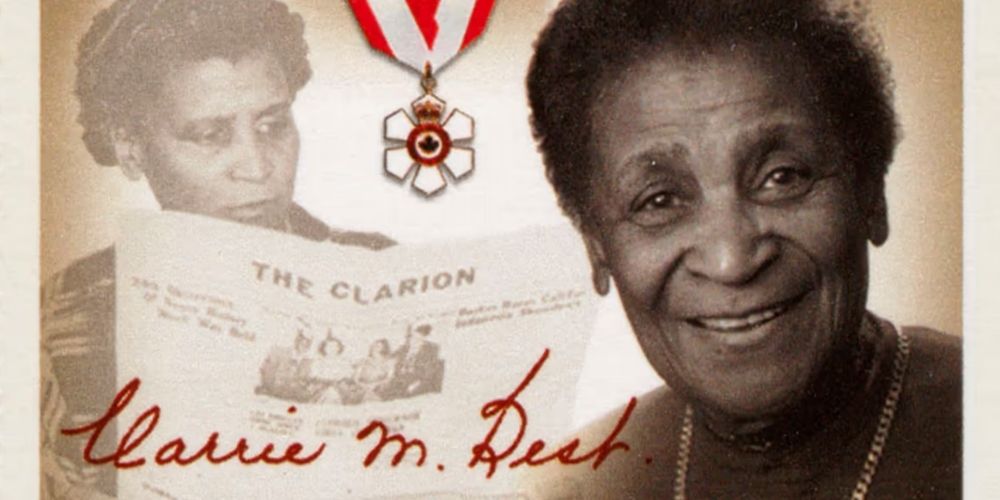Carrie Best: An Advocate For Human Rights

Carrie Mae Best (née Provoe), was a Canadian journalist, civil rights activist, and advocate of Nova Scotia's Black community.
She is also the founder of one of Nova Scotia’s first Black-owned and published publications and has received many awards and accolades for her work in civil rights.
A Brief History Of Carrie Best
Born in New Glasgow, Nova Scotia, Carrie married Albert T Best in 1925. The two had a son together, J Calbert Best, and later fostered 4 other children – Berma, Emily, Sharon, and Aubrey Marshall.
In December 1941, Black school girls were removed by force from the Roseland Theatre for attempting to sit in the “white only” section. Carrie approached the theater’s owner to argue against the racist policies. Having little success, she and her then 38-year-old son tried to buy tickets for the main floor. They instead received tickets for the balcony, an area designated for Black patrons.
Leaving their tickets behind, the two walked into the “white-only” area. After refusing to leave at the manager’s request, the Bests were roughly removed from the theater and charged. Carrie now had what she needed to take legal action, claiming assault and battery, damage to her coat, and breach of contract. Unfortunately, the 1942 case failed. The bigger issue of racism lost out to the owner’s right to exclude whomever he wanted from his property.
Carrie Goes To Print And Radio
Losing the court case didn’t slow Carrie down. Four years later, she and her son started one of the first Black-owned and published publications in Nova Scotia – The Clarion. The paper reported on a number of topics from news to sports to social activities. More importantly, it advocated for Black rights and other important issues, emphasizing better race relations. By 1956 the newspaper was getting national circulation under the name The Negro Citizen.
It was during the paper’s growth that Carrie launched The Quiet Corner, a radio show that was broadcast to 4 stations in the maritimes. The show ran for 12 years starting in 1952. From 1968 to 1975, she also had a column in the Pictou Advocate called Human Rights that advocated for Aboriginal people, Black people, and other groups. And in 1975, she founded the Kay Livingstone Visible Minority Women’s Society of Nova Scotia to provide educational funding to Black women.
RELATED: Learn about more Black Canadians who helped shape Canada’s heritage, culture, and identity …
Carrie Best’s Accolades
Over the years, Carrie earned a number of awards, recognitions, and other achievements. Some of the most important include:
- Member of the Order of Canada in 1974
- Queen Elizabeth Medal in 1977
- An honorary doctor of laws (LLD) from St Francis Xavier University in Antigonish, Nova Scotia in 1975
- Officer of the Order of Canada in 1979
- An honorary doctor of civil laws (DCL) from the University of King’s College in Halifax, Nova Scotia in 1992 (the University also has a Dr. Carrie Best Scholarship for Black and Aboriginal students)
- Inducted into the Nova Scotia Black Wall of Fame in 1980
- Harry Jerome Award in 1986
- Harambee Membership Plaque in 1987
- Black Professional Women’s Group Award Certificate in 1989
- Award of Excellence in Race Relations from the Minister of State for Multiculturalism in 1990
- Nova Scotia Human Rights Commission Award in 1991
- Town of New Glasgow Award for work in race relations in 1992
- Congress of Black Women Certificate in 1993
She was also awarded the Order of Nova Scotia in 2002, a year after her passing.
As the founder of one of the first Black publications in Nova Scotia, Carrie Best was a leader in the fight for civil rights and justice for all. Her voice, insight, and dedication have been an inspiration and source of strength to many.
Featured Image – Carrie Best stamp from The Canadian Encyclopedia
Beat FOMO by being in the know!
Sign up for our newsletter today and never miss a beat.







